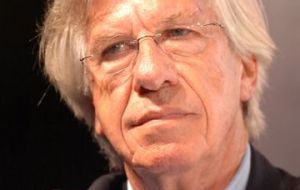MercoPress. South Atlantic News Agency
Uruguay calls for a Mercosur with “open regionalism” for smaller members
 Vice-president Astori said “flexibility” and “cooperation” need to be integrated to the Mercosur vocabulary
Vice-president Astori said “flexibility” and “cooperation” need to be integrated to the Mercosur vocabulary Uruguay called on Brazil and Argentina to allow Mercosur junior members to reach unilateral trade agreements with third countries helping to boost the group’s dynamism.
Speaking before business leaders and members of the Brazilian embassy in Montevideo, Vice President Danilo Astori reaffirmed Uruguay’s commitment to a stronger Mercosur, “but this should not be an obstacle for small countries to reach trade agreements outside the framework of the regional organization”.
As a small country Uruguay needs a maximum international insertion and “we don’t have to take Mercosur as the end of the line but rather a collective launching platform with our neighbours, to a full integration with the rest of the world”, said Astori addressing the Uruguay-Brazil integration Forum organized by the Uruguayan-Brazilian chamber of commerce.
Astori, who was Finance minister of the previous government, said that the idea of an “open regionalism” was at the heart of Mercosur creation in 1991, “but this has not worked out as such”.
“We are granting our Mercosur partners greater trade advantages than to the rest of the world. What matters is that that concession to the rest of the world, different to the one enjoyed by Mercosur, should not become an impediment for international competition. That is what we define as open regionalism, making both compatible”, insisted the Vice-president.
However he immediately pointed out he was not promoting the “liberal concept” of unrestricted opening to the rest of the world, but rather a concept of greater ‘flexibility’.
“If limitations to internal circulation of goods originate special problems for the smaller countries, and when the joint negotiation agenda is not possible, opening opportunities for (Mercosur) smaller countries to reach out of the block agreements should be an option”, added Astori.
The Uruguayan official said that while Uruguay and Paraguay negotiate out of the block deals, “Argentina and Brazil could have greater latitude and time to solve their bilateral problems regarding non tariff restrictions and ‘political asymmetries’”.
“Flexibility will ultimately help to strengthen Mercosur”, he insisted and pointed to some proposals to better regional integration.
No internal barriers or difficulties to access markets; a Mercosur ‘moderate protectionism’ with the rest of the world should not become an impediment to promote competition which is essential for any successful production process.
“This is why trade agreements with other blocks are so needed” and integration “means mainly cooperation, a coordination of the economic policies of the different members of the regional block”.
Besides scientific, technological and cultural cooperation what is also needed are joint infrastructure projects “such as those proposed by President Lula da Silva”. And for this “appropriate financial institutions are needed to ensure the realization of such projects”.
Finally Astori underlined the importance of the recent agreement on the Mercosur Customs code reached at the latest Mercosur summit in Argentina. He said Uruguay was the country most punished by the double charge of the common external tariff.




Top Comments
Disclaimer & comment rules-

Read all commentsThis sounds promising. Uruguay no longer wants to drag along tied to Argentina and Brazil. Sensible.
Aug 12th, 2010 - 10:52 pm 0Commenting for this story is now closed.
If you have a Facebook account, become a fan and comment on our Facebook Page!